7 basic knowledge of acquiring the PSE mark for businesses who want to handle mobile batteries!

Hello. It is the moat of the caretaker. In recent years, the necessity and importance of mobile batteries (storage batteries) that use lithium-ion batteries as charging tools for smartphones and PCs, and as power supply tools in the event of a disaster, has been rapidly increasing. Mobile batteries are an indispensable tool in the so-called "smart society," and as demand increases, so does the supply (distributors). However, on the other hand, due to a series of battery fire accidents, the Ministry of Economy, Trade and Industry (METI) made mobile batteries using lithium-ion batteries eligible for PSE in February 2019. In other words, mobile batteries that are not guaranteed to be safe (PSE certified) have been completely illegal. Just before the legislation was enacted in February 2019, social problems such as mobile batteries that were not PSE certified were sold on the Internet. Since then, battery accidents have occurred frequently, and I personally feel that PSE for mobile batteries is not complied with due to the new legal system. However, on the other hand, it can be said that the delay in responding to others is also a business opportunity. We have certified mobile batteries for PSE many times. Based on that experience, I would like to write about the flow of the inspection and precautions. 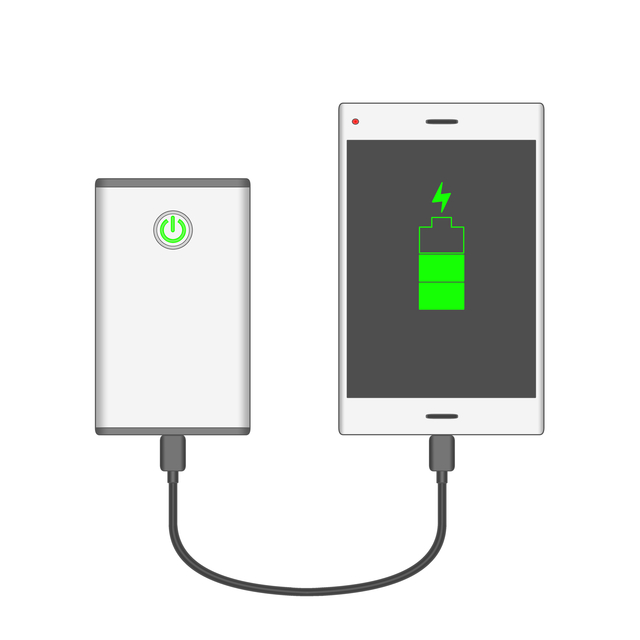
Contents
- 1 History of PSE legislation for mobile batteries (storage batteries)
- 2 Concept of livestock batteries subject to PSE
- 3 Pse certification flow ~ In the case of mobile battery ~
- 4 What kind of inspection does PSE authentication for mobile batteries perform?
- 5 How much does it cost to authenticate?
- 6 It is more advantageous to have done battery certification in the production area (overseas)
- 7 About PSE display ~ Introduction in the example ~
History of PSE legislation for mobile batteries (storage batteries)
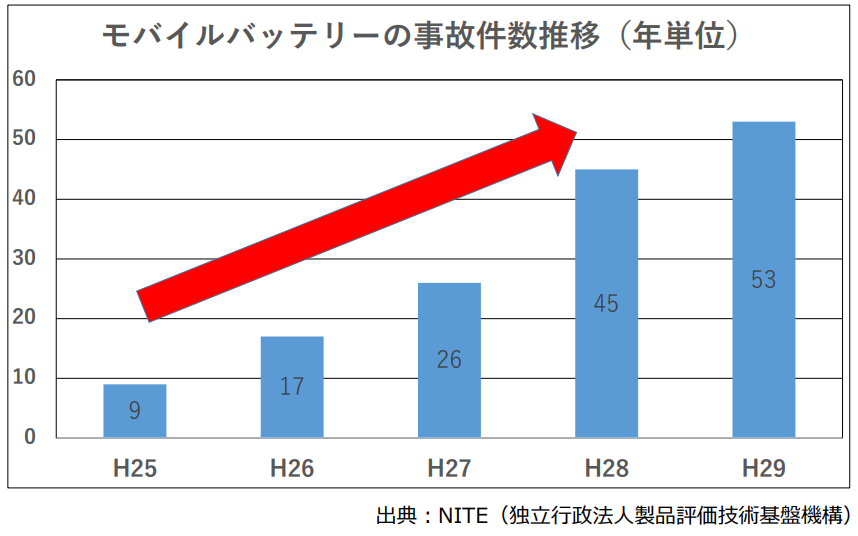 Reference: Ministry of Economy, Trade and Industry website "Electrical Appliance and Material Safety Act_Mobile Battery_1.Overview" As mentioned above, while the demand for mobile batteries increases as society becomes smarter, there are many products on the market that do not guarantee quality, and the number of accidents is rapidly increasing as shown in the data. By the way, it seems that about 70% of the total of about 150 accidents in this document were accidents involving fires. Whether this number of 150 is high or low may be a matter of opinion. However, at least 10 or 20 years ago, there would have been almost no accidents caused by mobile batteries, so this is a problematic figure, and it is easy to assume that it will increase further in the future. Against this background, the Ministry of Economy, Trade and Industry (METI) made mobile batteries subject to regulation under the Electrical Appliance and Material Safety Act (PSE) in February 2019.
Reference: Ministry of Economy, Trade and Industry website "Electrical Appliance and Material Safety Act_Mobile Battery_1.Overview" As mentioned above, while the demand for mobile batteries increases as society becomes smarter, there are many products on the market that do not guarantee quality, and the number of accidents is rapidly increasing as shown in the data. By the way, it seems that about 70% of the total of about 150 accidents in this document were accidents involving fires. Whether this number of 150 is high or low may be a matter of opinion. However, at least 10 or 20 years ago, there would have been almost no accidents caused by mobile batteries, so this is a problematic figure, and it is easy to assume that it will increase further in the future. Against this background, the Ministry of Economy, Trade and Industry (METI) made mobile batteries subject to regulation under the Electrical Appliance and Material Safety Act (PSE) in February 2019.
Concept of livestock batteries subject to PSE
For the classification of mobile batteries subject to PSE and non-PSE, see the Ministry of Economy, Trade and Industry's "Electrical Appliance and Material Safety Act_FAQ on Mobile Batteries" I would like you to refer to it because it is well summarized in, but I will tell you very briefly. According to the Ministry of Economy, Trade and Industry, the definition of a mobile battery subject to PSE is "a mobile battery whose volumetric energy density per built-in single cell is 400 Wh/L (watt-hour per liter) or more, and is intended to supply power to others." Regarding the density of batteries, what is "intended to supply power to others"? First of all, there are Wi-fi routers, smartphones, tablets, notebook PCs, cordless vacuum cleaners, etc. These certainly have a built-in lithium-ion battery and a power storage function, but they are intended to be used to charge the main product, and are not intended to supply power to machines such as external ones. They are not considered mobile batteries. However, if there is a required certification other than the mobile battery, that certification is naturally required. It means that it is not covered by the mobile battery. On the other hand, those sold purely as mobile batteries, charging cases used for electronic cigarettes and wireless earphones, etc. are subject to mobile batteries because they are intended to supply power to others (main units). Wireless earphones can be said to be a luxurious product that straddles two certifications, the wireless radio wave method and the PSE of the mobile battery, even though they are such a small product. 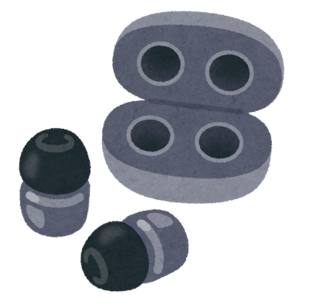
Pse certification flow ~ In the case of mobile battery ~
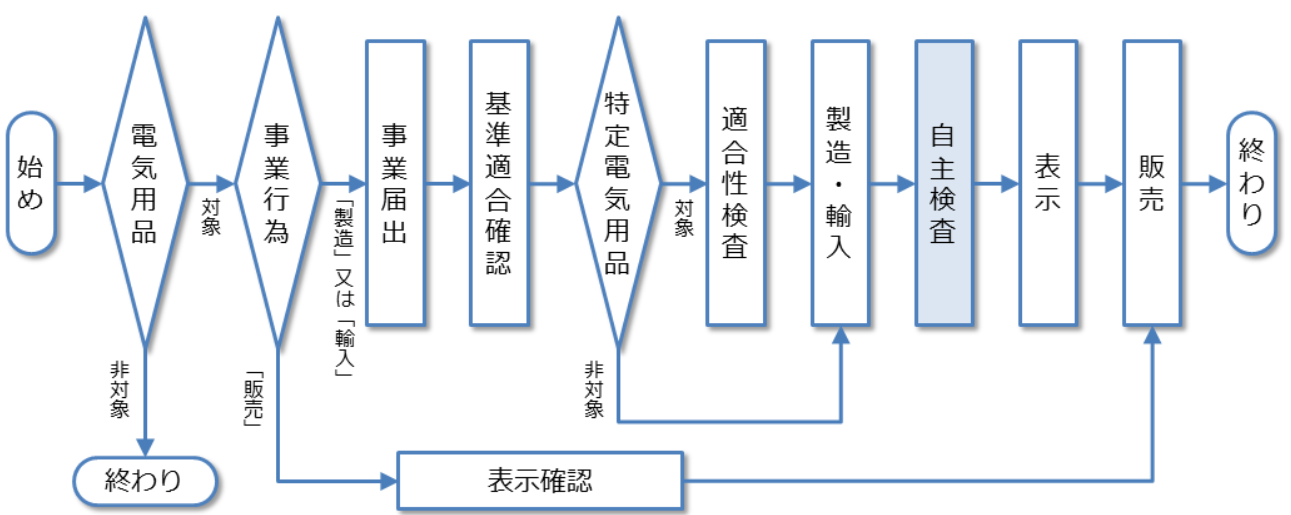 Reference: Ministry of Economy, Trade and Industry website "Electrical Appliance and Material Safety Act _Flow of Notification and Procedure" We also quote the PSE (Electrical Appliance and Material Safety Act) inspection procedure flow of the Ministry of Economy, Trade and Industry. For the basic contents, please refer to "PSE, PSC, and Radio Law Suitability Inspection Procedures, and this much for the time being (1) PSE _PSE Certification Flow". Since mobile batteries are not specified electrical appliances and materials but non-specified electrical appliances, there is no conformity inspection (factory inspection). Once the sample inspection is completed, manufacturing and import can begin, and applications can be made to the Bureau of Economy, Trade and Industry.
Reference: Ministry of Economy, Trade and Industry website "Electrical Appliance and Material Safety Act _Flow of Notification and Procedure" We also quote the PSE (Electrical Appliance and Material Safety Act) inspection procedure flow of the Ministry of Economy, Trade and Industry. For the basic contents, please refer to "PSE, PSC, and Radio Law Suitability Inspection Procedures, and this much for the time being (1) PSE _PSE Certification Flow". Since mobile batteries are not specified electrical appliances and materials but non-specified electrical appliances, there is no conformity inspection (factory inspection). Once the sample inspection is completed, manufacturing and import can begin, and applications can be made to the Bureau of Economy, Trade and Industry.
What kind of inspection does PSE authentication for mobile batteries perform?
The singularity of mobile batteries may lie in the inspection content. Earlier, I introduced that "the volumetric energy density per built-in single cell is 400 Wh / L (watt-hour per liter) or more", but you may not be familiar with the calculation formula unless you are an expert. However, since a reasonable volumetric energy density is required to function as a mobile battery, it may be safe to assume that most batteries are subject to PSE. For the time being, I would like to show the calculation formula shown by the Ministry of Economy, Trade and Industry.  In addition, there are 16 test items, including "safety during continuous constant voltage charging", "safety during vibration during transportation", "safety of assembled battery containers at high temperatures", "safety during temperature changes", "safety in the event of external short circuit", "safety in the event of dropping", "safety at the time of impact", "safety at the time of abnormally high temperature", "safety during compression", "safety in the event of equipment falling", etc. is shown in the Ministry of Economy, Trade and Industry materials. We aim to be able to clear these at once, but in the past, some customers had to re-inspect because liquid leaks occurred at a temperature of 0 degrees. In addition, in order to perform these tests, samples of nearly 100 single cells and more than 30 assembled batteries are required, and it is quite hard work just to have them lined up at the factory. That alone can be said to be a certification with a high hurdle for mobile batteries, and it means that safety cannot be protected without such inspection.
In addition, there are 16 test items, including "safety during continuous constant voltage charging", "safety during vibration during transportation", "safety of assembled battery containers at high temperatures", "safety during temperature changes", "safety in the event of external short circuit", "safety in the event of dropping", "safety at the time of impact", "safety at the time of abnormally high temperature", "safety during compression", "safety in the event of equipment falling", etc. is shown in the Ministry of Economy, Trade and Industry materials. We aim to be able to clear these at once, but in the past, some customers had to re-inspect because liquid leaks occurred at a temperature of 0 degrees. In addition, in order to perform these tests, samples of nearly 100 single cells and more than 30 assembled batteries are required, and it is quite hard work just to have them lined up at the factory. That alone can be said to be a certification with a high hurdle for mobile batteries, and it means that safety cannot be protected without such inspection.
How much does it cost to authenticate?
The cost varies depending on the product, and whether the business or the factory bears the many sample costs mentioned above. Since the standard cannot be seen, if you dare to give a rough estimate, it seems that the standard pure certification alone will cost about 30 ~ 500,000 yen per product. The Company's fee will be added to this.
It is more advantageous to have done battery certification in the production area (overseas)
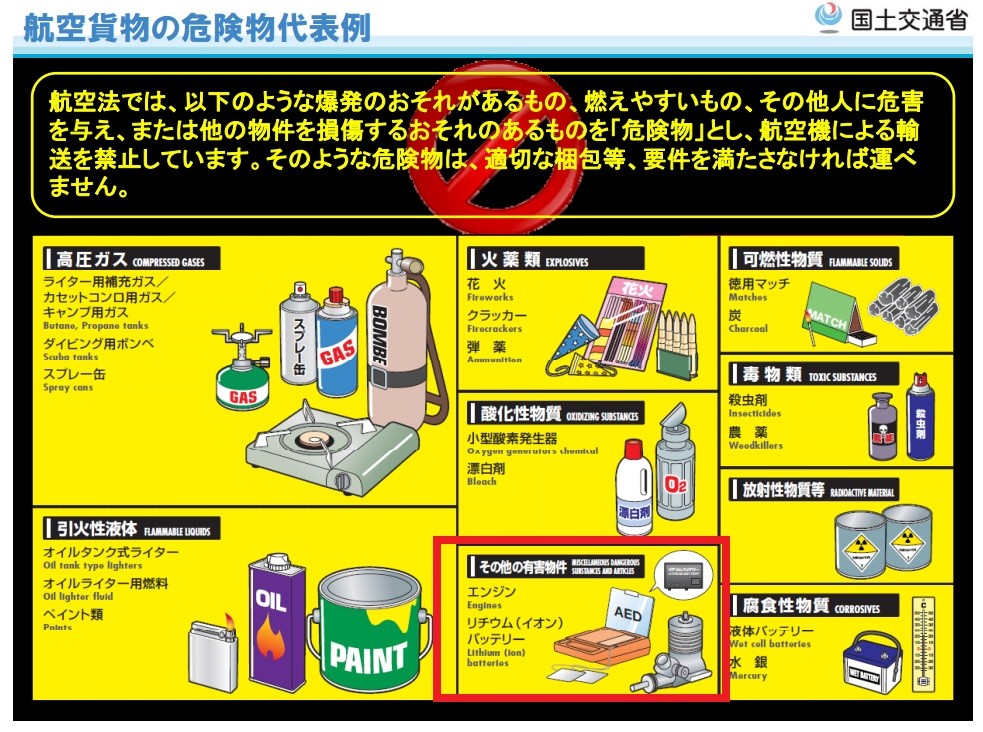
Reference: Ministry of Land, Infrastructure, Transport and Tourism
Many of you may have seen this list of restrictions on bringing in when flying. Lithium-ion batteries have a risk of ignition accidents as explained at the beginning, and transportation is strictly restricted. On the other hand, most mobile batteries are produced in China. Of course, transportation is not prohibited, so transportation is naturally possible if you follow the prescribed procedures, but it may take more time and cost than regular products. Especially for overseas transportation, the procedure may not be passed without appropriate know-how. It cannot be helped when selling it in the end, but it would be difficult if the sample for certification was transported overseas, so I think it is a wise decision to have the battery produced in China done by a Chinese inspection agency. We can support such arrangements, so please feel free to contact us if you have any requests.
About PSE display ~ Introduction in the example ~
Finally, I would like to tell you about PSE display, using the mobile batteries currently in circulation as an example. 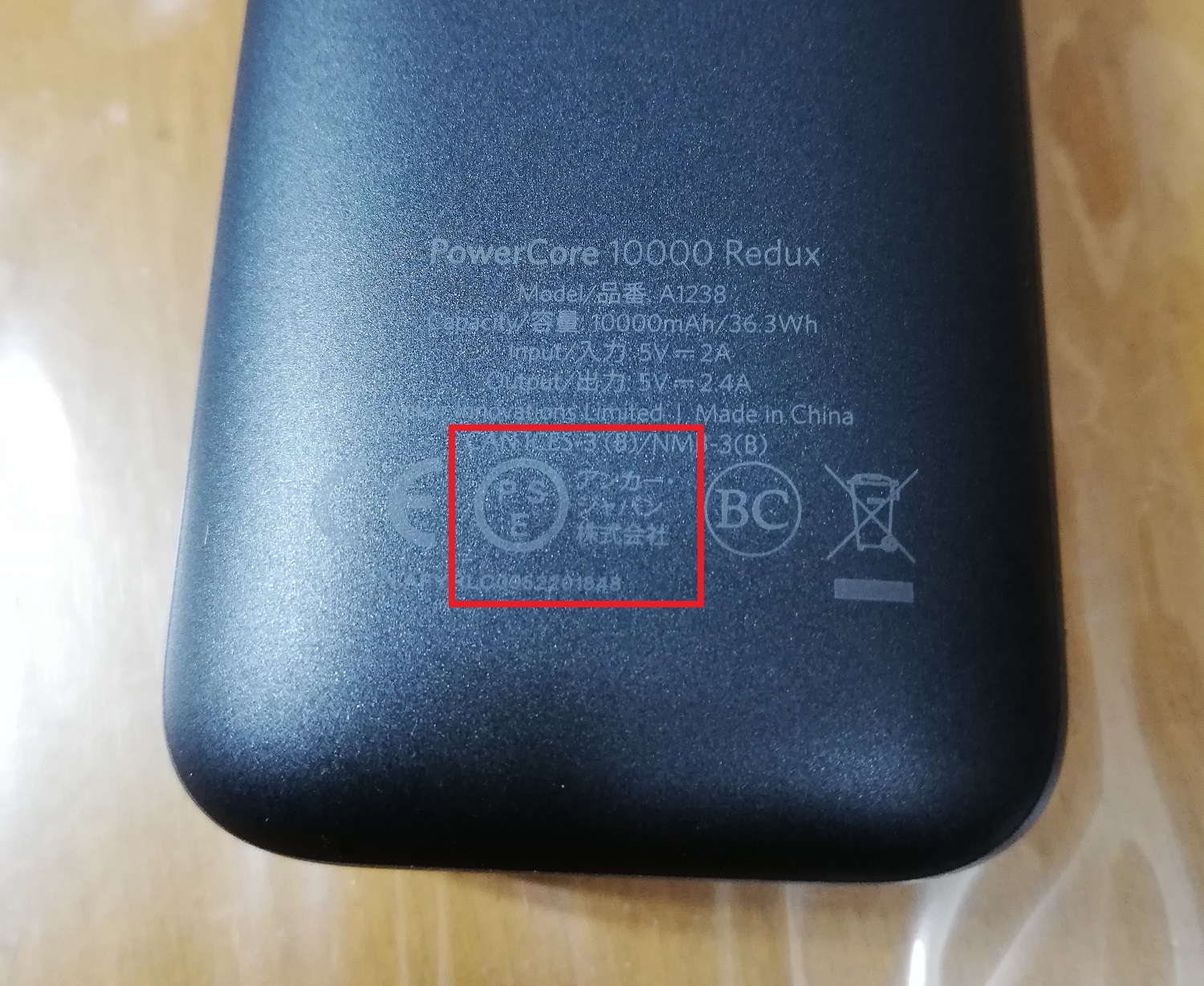
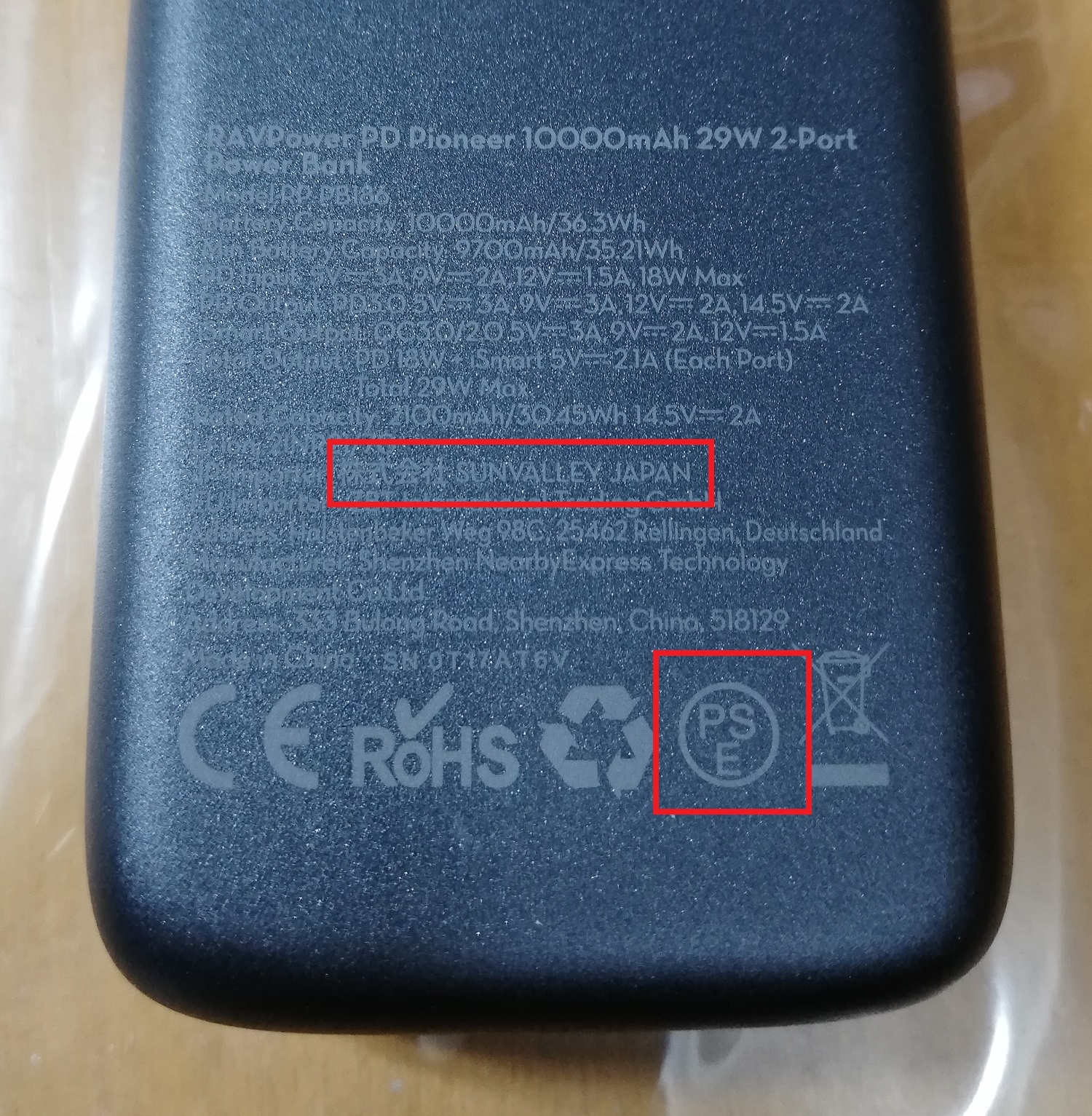 The two photos are mobile batteries that I bought on Amazon on the same day. One belongs to the famous Chinese gadget manufacturer Anker. This company also has Japan legal entities. The other one also seems to be a solid company. Both companies have PSE certification written on the sales screen, and the PSE mark is firmly displayed on the products. On the other hand, there are various conditions for this labeling, and unfortunately there are illegal products that are just copied and pasted with the PSE logo. I don't want to go into too much detail about it on the website, so if you are interested, please contact us directly. In any case, the legislation on PSE for mobile batteries is a recent issue, so I feel that there will be great business opportunities in the future if we respond properly. We have all the know-how up to pass the certification for mobile batteries, so if you are considering certification or want to try it a little, please contact us.
The two photos are mobile batteries that I bought on Amazon on the same day. One belongs to the famous Chinese gadget manufacturer Anker. This company also has Japan legal entities. The other one also seems to be a solid company. Both companies have PSE certification written on the sales screen, and the PSE mark is firmly displayed on the products. On the other hand, there are various conditions for this labeling, and unfortunately there are illegal products that are just copied and pasted with the PSE logo. I don't want to go into too much detail about it on the website, so if you are interested, please contact us directly. In any case, the legislation on PSE for mobile batteries is a recent issue, so I feel that there will be great business opportunities in the future if we respond properly. We have all the know-how up to pass the certification for mobile batteries, so if you are considering certification or want to try it a little, please contact us.

